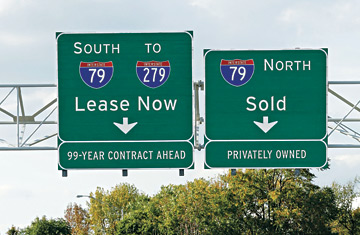
Companies are buying leases of public highways, bridges and tunnels from states desperately trying to improve infrastructure.
(2 of 2)
Carson argues that the public sector can wring plenty of cash out of toll roads by essentially behaving like the private sector and charging market rates for usage. The express lanes of State Road 91 in Southern California, for example, carry some of the highest tolls in the nation--at peak hours, nearly a dollar a mile--which may annoy drivers but help pay for the state's transportation needs. The Pennsylvania Turnpike commission has produced a plan to raise turnpike tolls and attach tolls to other roads in the state.
Deals in which the private sector actually builds new infrastructure are usually a better bargain for the public. The state or city gets a new stretch of highway or a bridge or a tunnel, and it shifts risk to its private partner--a genuine benefit. If construction costs spike or expected traffic doesn't materialize, that's the company's problem. "We've had some governments say to us, 'I don't really need to be in that business,'" says Mark Florian, who oversees infrastructure deals for Goldman Sachs. These so-called greenfield projects are starting to catch on. And some states are getting savvy about how to structure the terms. The 50-year lease for Texas' State Highway 130, for example, includes a revenue-sharing clause that nets the state 4.6% of gross receipts at first and up to 50% as traffic increases--just in case the road proves more valuable than predicted.
And even though 2007 has placed a few speed bumps in their way, public-private partnerships are almost certainly here to stay. Many of the financiers who run infrastructure funds actively drum up deals--some states allow unsolicited bids, and bankers have fanned across the country in response--and the big global players in infrastructure have set up shop too. Worldwide, somewhere from $50 billion to $150 billion worth of equity is waiting to be invested in infrastructure of all stripes (including assets like airports and water systems), and much of that is trained on the U.S. "U.S. infrastructure needs lots and lots of capital, and it's not obvious where all that money is going to come from," says Murray Bleach, who runs U.S. operations for Macquarie. "The potential is huge." With all that cash waiting in the wings, other concerns may not stand a chance.
